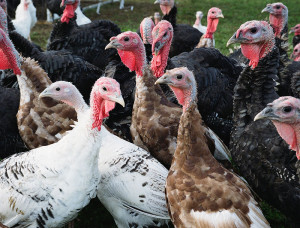Get back to real Thanksgiving roots with the birds that nature built from Wyebrook Farms
By Cathy Branciaroli, Food Correspondent, The Times

Heritage turkeys including the black birds, Broad Breasted Bronze, the white ones, Royal Palms and the browns, which are Bourbon Reds
Chances are if you are like most Americans on Thanksgiving Day you’ll be serving turkey, a native bird that Benjamin Franklin thought would have a been a better national symbol than the bald eagle. Something like 99.99% of families prepare a turkey dinner, as evidenced by the fact that, Butterball, a leading brand, provides the nation with roughly 13.5 million of them each Thanksgiving. That’s a LOT of turkey.
Picture yourself, carving set in hand, with a perfect Norman Rockwell turkey as the centerpiece on the platter in front of you just ready to carve — plump legs, golden browned breast, a favorite piece for everyone in the family. Yum – right? Well certainly, it will be a great meal, with Grandma’s stuffing, sweet potatoes, cranberry relish and pumpkin pie.
But did you know that there’s an unexplored world of turkeys that truly resemble the wily, energetic and tasty birds that the early Pilgrims found in the wild when they arrived in America?
These are heritage breeds that are the ancestors of the common Broad-Breasted White turkeys that can be found in the freezer case of your nearby grocery store or Walmart. And they taste considerably different, some say, better.
This is because the birds are raised outdoors eating grass and bugs in pastures on small farms like Wyebrook Farm in Honey Brook
Their meat is like “eating sunshine,” said farmer Dean Carlson, who is among those to have made it their mission to preserve these heritage breeds, which almost were lost in the rush to breed large, breast-heavy birds in the pursuit of convenience since the 1960’s. “These turkeys get most of their diet from ranging outside during the day, and they develop tasty muscle meat by getting lots of exercise. Their meat is denser and rich in flavor,” he said.
Today, after years of engineering, the Broad-Breasted White has morphed into a bird that cannot run, fly or mate. They are artificially inseminated, because even if old Tom wanted to get romantic, his huge chest would keep him too far away from the object of his desire.
In contrast, the Bourbon Red, Broad Breasted Bronze and Royal Palms offer flavors that are described as being as richer and more intense. The Bronze had been the most popular turkey throughout most of American history,but waned in popularity beginning in the mid-20th century. Royal Palms are a very endangered breed today, classified as being on “watch” status with the American Livestock Conservancy.
Dean and wife Emilie started raising heritage breeds including chicken and pigs in 2010, after he left a career in finance, having become fascinated with the idea of sustainable farming. It became something he felt he had to do, he told me.
Raising these birds on pasture land the old fashioned way is hard work and requires investment in grazing pasture, grain to supplement pasture grasses and all manner of other expenses. The farmers themselves are barely making a profit.
This year Dean is offering heritage breed turkeys from their friends at Double Brook Farm in Hopewell, NJ. They are offering pastured, heritage breed birds in size ranges of 6-11lb, 12-17lb, 18-22lb, and over 23lb. They said that they are taking orders by email which will be available at Wyebrook for pickup on Wednesday, November 26th at a price of $6.50/lb. Birds can be ordered by emailing at in**@**********rm.com.
If you can afford to pay the difference, I’ve been told you will be rewarded with a flavor that will make you grateful for all the pasture grass those birds ate. So I am going to test the reporting that these heritage turkeys taste way better than anything that can be bought at the grocery store. On November 26th, I’ll be picking up my own heritage turkey from Dean and Emilie’s farm. Can’t wait to eat it and hope you order one too.
And, just in case you are short of family recipes for Thanksgiving Dinner, my friend Bobbi has 31 recipes to jazz up your Thanksgiving table
http://www.bobbiskozykitchen.com/2014/11/31-recipe-for-thanksgiving.html#.VGjJ1IeOX2c
Cathy Branciaroli also writes about her adventures in the kitchen on her blog Delaware Girl Eats




